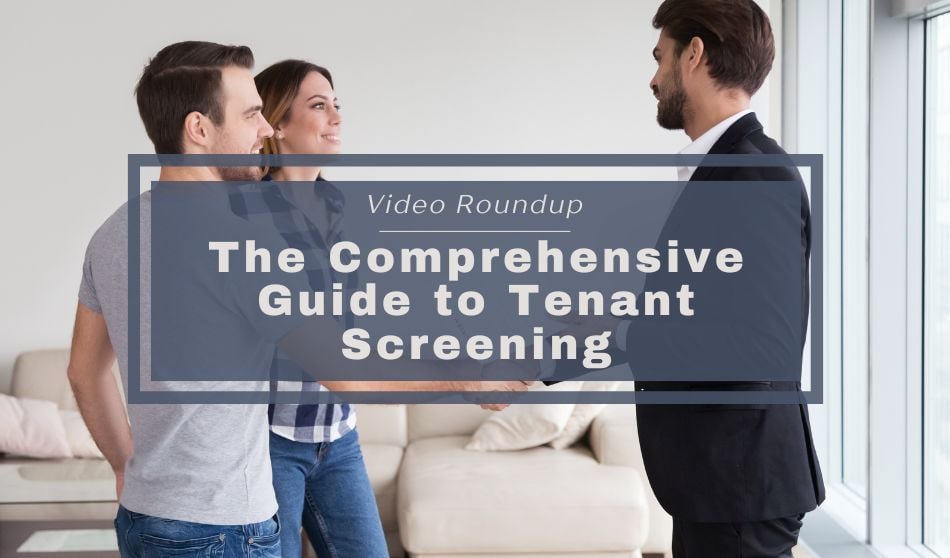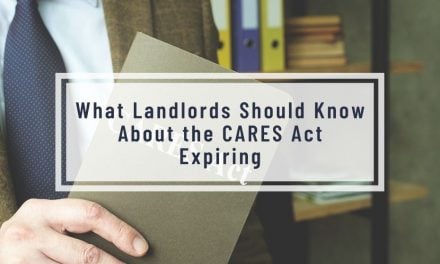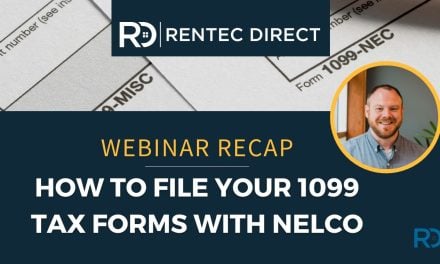
In this tenant screening video roundup, you’ll have all the expert guidance you need to accurately and legally screen prospective tenants. These five videos contain everything you need to know as a landlord or property manager about tenant screening from start to finish.
Vacancies may be a cash-flow killer, but choosing the wrong tenant for your rental property can cause even more headaches, which makes tenant screening one of the most essential failsafes to protect your investment.
Understanding the nuances of tenant screening, what kind of tenant screening options exist, how to read tenant screening reports, and most importantly, how to follow federal and state regulations regarding screening applications is vital to your success as an investor, landlord, or property manager.
Join Kaycee Miller, with Rentec Direct, as she dives into everything you need to know about tenant screening in her video series “Ask a Landlord.” Kaycee Miller is a landlord and real estate investor who has offered expert advice in the rental and real estate industry for over a decade, and her recommendations will prove invaluable for new investors and seasoned managers alike.
5 Essential Videos to Understand Tenant Screening from Start to Finish
Tenant Screening Basics:
Tenant screening is the process of reviewing rental applicant information in order to determine if someone is going to be qualified to rent in your rental property and sign a lease for you to enter into a housing agreement.
Learn more: Tenant Screening Basics – Video
Criminal Background Reports for Tenant Screening:
Criminal background reports are just one of the important tenant screening reports you can run, but it is essential that you understand how to read them and how to legally apply any information you learn.
When pulling criminal background reports, be certain you:
- Verify tenant identities through name, date of birth, and address
- Understand how local, state, and federal laws impact your ability to use criminal records in screening
- Know the differences between nationwide vs. county-level criminal searches
- Realize why or when some criminal records may not appear on national databases
This video dives into all of the nuances of criminal background reports and clarifies some of the municipal and state laws you may encounter that limit your scope or timing when pulling a report or applying the information to deny a potential applicant.
Learn more: Tenant Screening: How to Use Criminal Background Reports Effectively – Video
Eviction History Reports for Tenant Screening:
Having a clear evaluation process when encountering potential tenants with a history of an eviction is critical to ensure you make an informed and unbasied decision. Beyond deciding if you would accept a tenant who had been evicted from a previous rental, it is critical that you know the difference between a formal eviction and what will and will not show up on an eviction history report when you are doing tenant screening on a rental applicant.
The eviction process is a legal process that has to be filed with a court through a judge who rules in favor of a landlord in order to proceed with an eviction and get an unlawful detainer一the legal term for an eviction. This is different from a cure or quit notice which a renter may call or understand to be an eviction.
In this video, Kaycee Miller explains what an eviction is and how landlords and property managers can evaluate an eviction history report to make the most knowledgeable choice for the rental property. She also covers some considerations to help you evaluate situations where a tenant may have faced eviction and whether they impact your understanding of the tenants’ fiscal responsibility and potential care of the property.
Learn more: Do I need a Tenant Screening Eviction History Report? – Video
Income Verification for Tenant Screening:
Best practices for income requirements within the rental industry exist to help tenants and landlords alike. A renter who accepts a lease agreement at a property that they don’t meet the income requirements at, may face financial hardship that can prevent their long-term housing stability. For landlords, this means your tenant may struggle to pay rent on-time, if at all.
In this video, you will learn all about how to verify income on your rental applicants. As well as, key pieces of information such as:
- Understanding what an Income Verification Report is and how it works
- How income verification helps you assess rental applicants fairly and accurately
- The benefits of using PayScore with Rentec Direct to verify income
- How to stack income verification with credit, eviction, and criminal reports for a complete screening process
Learn more: How to Verify Income on your Rental Applicants – Video
Using an Adverse Action Notice After Tenant Screening
When tenant screening, you will hopefully come across the ideal and most qualified rental applicant right away. However, a comprehensive tenant screening package may bring to light information that shows a tenant does not qualify for your tenant screening criteria. Before you move forward with the next prospective tenant, it is legally required that you follow the necessary steps to compliant with federal housing laws and the Fair Credit Reporting Act (FCRA).
In this final recaps tenant screening reports, and how to avoid discrimination claims when denying housing applications. Most importantly, this video offers everything you need to know about adverse action letters and when an adverse action letter is required.
Learn more: Adverse Action Notice for Denying a Rental Application – Video





